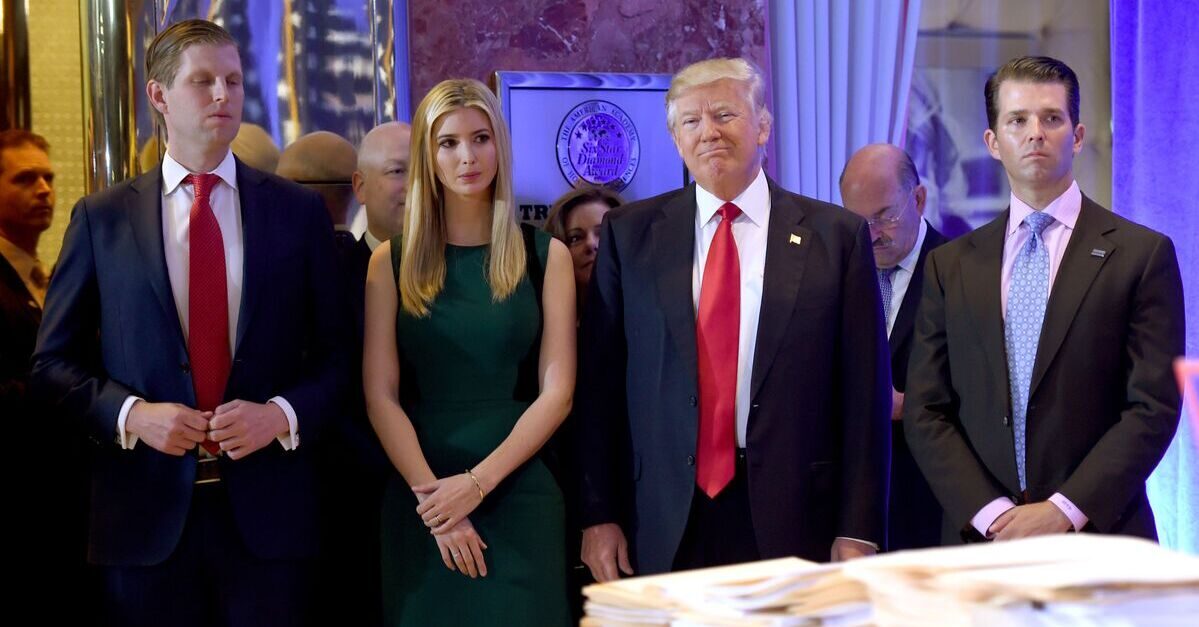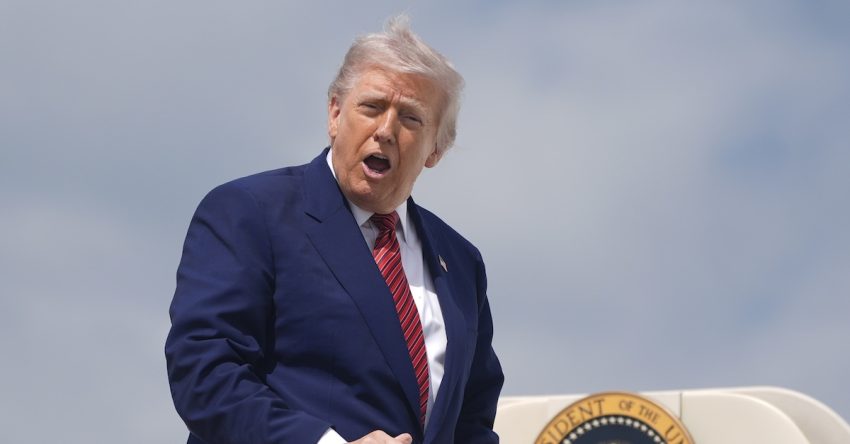President Donald Trump boards Air Force One to depart Joint Base Andrews, Md., Friday, May 23, 2025 (AP Photo/Manuel Balce Ceneta).
A court of appeals in New York on Thursday vacated the $454 million civil fraud judgment imposed on President Donald Trump and his namesake family business.
In a flurry of varying opinions spanning 323 pages, a panel determined the massive punishment imposed on the 45th and 47th president, the Trump Organization, and the company’s other executives – including Eric Trump and Donald Trump, Jr. – was unconstitutional.
“While the injunctive relief ordered by the court is well crafted to curb defendants’ business culture, the court’s disgorgement order, which directs that defendants pay nearly half a billion dollars to the State of New York, is an excessive fine that violates the Eighth Amendment of the United States Constitution,” the prevailing concurrence in the fractured decision issued by the five-judge panel reads. “[W]hile harm certainly occurred, it was not the cataclysmic harm that can justify a nearly half billion-dollar award to the State. It is a virtue of the statute that the Attorney General may act, as she did in this case, before a potential catastrophe occurs, to deter further fraudulent business behavior by defendants specifically, and to police market behavior generally. However, having achieved these goals the State is not entitled to compound its victory with a massive punitive fine.”
While extinguishing the hefty penalty against the Trump defendants, the appeals court did uphold the ability of the lower court to adjudicate the case and, just as notably, upheld the authority of New York Attorney General Letitia James to bring the case.
Love true crime? Sign up for our newsletter, The Law&Crime Docket, to get the latest real-life crime stories delivered right to your inbox.
“We agree with Supreme Court that the Attorney General acted well within her lawful power in bringing this action, and that she vindicated a public interest in doing so,” the concurrence by Justices Dianne T. Renwick and Peter H. Moulton goes on. “We also find that Supreme Court properly ruled only on claims that are timely under the applicable statute of limitations. However, we would modify the remedy ordered by Supreme Court.”
In what is ultimately a plurality decision, the court fails to reach a majority opinion – with a controlling analysis – for a course of action going forward. Instead, two justices begrudgingly agree to the obscurely-worded “decretal of this decision for the sole purpose of ensuring finality.”
In real terms, the findings of the lower court are being allowed to stand while the judgment is not. This will allow the parties to essentially re-litigate the matter before the Empire State’s final state court of appeal. The contours of that appeal are not set in stone.
Justices John R. Higgitt and Mary Rosado explain why they would have gone further in the defendants’ favor and ordered a new trial.
“It appears that defendants are correct when they argue that Supreme Court’s errors affected the conduct of the trial,” their concurrence reads. “Supreme Court’s error permeated the trial.”
The secondary concurrence explores the trial court record at length and reaches the conclusion that Justice Arthur Engoron mixed up the elements of two different causes of action – illegality and fraud – when issuing a favorable opinion for the attorney general’s office.
Specifically, the secondary concurrence argues the trial court used the “magnitude of disparity” between varying real estate appraisals to determine whether or not the defendants were intentionally trying to deceive. That, the justices argued, is not how the law is written.
The fifth panelist – Justice David Friedman – would have gone even further in the defendants’ favor and dismissed the case entirely.
Quite a bit of the third concurrence is focused on politics.
Friedman opines, at length:
I am troubled that my colleagues are affirming Supreme Court’s liability finding, notwithstanding that three out of the five members of this panel clearly believe that the judgment should be vacated, as the Attorney General has not yet proven her case. Nonetheless, what emerges from this Court’s vacating the $500 million disgorgement award, with which I concur, is the frustration of what appears to me to have been the Attorney General’s true aim in bringing this action. Plainly, her ultimate goal was not “market hygiene,” as posited by Justice Moulton, but political hygiene, ending with the derailment of President Trump’s political career and the destruction of his real estate business. The voters have obviously rendered a verdict on his political career. This bench today unanimously derails the effort to destroy his business.
The tertiary concurrence advises the court to “correct clear error” in the context of an earlier decision in the same case.

U.S. President Donald Trump along with his children Eric, Ivanka and Donald Jr. arrive for a press conference January 11, 2017 at Trump Tower in New York (TIMOTHY A. CLARY/AFP via Getty Images).
In that earlier decision, Ivanka Trump had James’ allegations against her dismissed due to the statute of limitations, while the case against the other Trump defendants went forward.
Here, Friedman would have the holding in that earlier case actually foreclose the present case entirely – because he does not think James’ lawsuit and the ensuing judgment “vindicate” any clear “public purpose.” Similarly, the secondary concurrence would apply the holding in that earlier iteration of the case to remove several legs from James’ argument due to the statute of limitations.
In sum, Higgitt, Rosado and Friedman argue James did not sufficiently prove her case about the underlying fraud – at least not yet.
The prevailing concurrence strongly rejects this interpretation.
Moulton and Renwick argue, at length:
In this appeal, we have before us an actual record which demonstrates clearly that defendants committed fraud and illegality…We do not have before us some hypothetical future misuse of the statute. The record also refutes Justice Friedman’s implication that the judicial system is being used for “political ends” in this litigation. The antithesis is true. Given the evidence uncovered during the Attorney General’s investigation…the “political” choice would have been to not bring this case, thereby avoiding a fight with a powerful adversary. Her allegations have been tested at every stage of this maximalist litigation and for the most part have been upheld. We now have before us the evidence the Attorney General amassed and it demonstrates that defendants engaged in a decade-long pattern of financial fraud and illegality.
In a statement, James’ office praised the outcome that allowed the fraud judgment to stand and vowed to pursue the matter on appeal.
“The First Department today affirmed the well-supported finding of the trial court: Donald Trump, his company, and two of his children are liable for fraud,” the prosecutor said. “The court upheld the injunctive relief we won, limiting Donald Trump and the Trump Organization officers’ ability to do business in New York. It should not be lost to history: yet another court has ruled that the president violated the law, and that our case has merit. We will seek appeal to the Court of Appeals and continue to protect the rights and interests of New Yorkers.”
The post ‘An excessive fine that violates the Eighth Amendment’: Appeals court vacates $454 million civil fraud judgment against Trump and his family business first appeared on Law & Crime.
Click this link for the original source of this article.
Author: Colin Kalmbacher
This content is courtesy of, and owned and copyrighted by, https://lawandcrime.com and its author. This content is made available by use of the public RSS feed offered by the host site and is used for educational purposes only. If you are the author or represent the host site and would like this content removed now and in the future, please contact USSANews.com using the email address in the Contact page found in the website menu.





